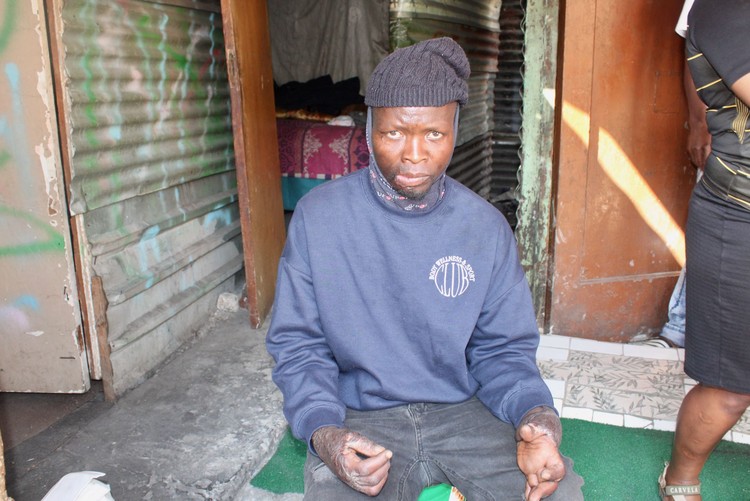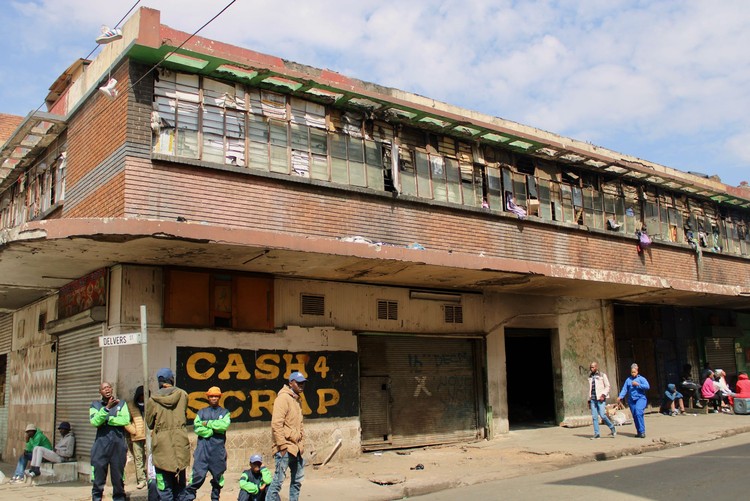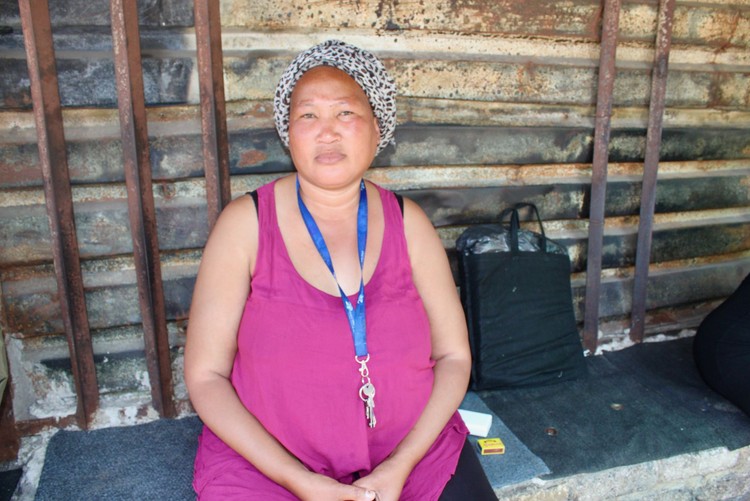Residents of Johannesburg’s “dark buildings” fear for their lives after deadly fire
Fires are a constant threat for people living in dilapidated buildings without electricity
“How many times must I burn before someone can hear my cry?” asks Sibongiseni Ndlovu, who lives in a dilapidated building in inner city Johannesburg. He says he has experienced five fires. His hands and body are scarred from burn wounds. Photos: Kimberly Mutandiro
- People who live in the “dark buildings” in inner city Joburg say fires are frequent and a constant threat.
- Some residents who survived the fire in the Albert Street building in which 77 people lost their lives last week have moved into similar buildings nearby.
- The Gauteng MEC for social development said the need for shelter should not be allowed to “protect criminality”.
People who live in “dark buildings” in inner city Johannesburg, similar to the one at 80 Albert Street, in which at least 77 people died in the inferno last week, have told GroundUp that they fear for their lives. The death toll from the fire may still rise.
Several residents said they have gone from one mnyama ndawo (dark places/buildings) to the next to find a refuge.
Sibongiseni Ndlovu says he has survived five fires in the past seven years.
He has no stable income and searches for places where he can live free of charge or at a rental low enough for him to afford. These places are often without electricity, and people use illegal connections, candles, and paraffin.
He currently lives in a building along Delvers Street, not far from 80 Albert Street. The interior is subdivided with boards and is home to more than 100 people. Some people pay rent to the slum lords, some stay there without paying rent.
In 2020, he was injured in a fire that burnt down EmaXhoseni informal settlement in Marshalltown.
“I am lucky to be alive. But I may not say the same next time, because the buildings we live in are not safe,” said Ndlovu.
“How many times must I burn before someone can hear my cry?” he asked, showing us his burn-scarred hands.
A dilapidated building in Delvers Street where about 100 people live. Part of the building caught fire earlier this year, but residents managed to extinguish the flames.
John Nkomo, who also moved from EmaXhoseni three years ago to the same building Ndlovu stays in, said: “Even if we wanted to leave, where would we go because we cannot afford the high rents?”
He survives by selling recyclables and asking for handouts at traffic lights.
He is partially blind and lives in constant fear, not only from fire but also from criminals. Part of the building caught fire earlier this year, but residents managed to extinguish the flames.
Another resident, Nokuthula Sibande, said a friend of hers died in the Albert Street building fire.
“Much as we may be afraid, we have no choice. People like us come to Joburg in search of a better life and end up living on the streets because there are no jobs,” she said.
Vuyokazi Singatha, who lives in the Express Building along Commissioner Street, said fires are frequently caused by candles and people burning things for warmth. She said she has been on the housing waiting list for years.
“We have been crying for attention for years, but no one has been listening to us,” said Singatha. “How many more people need to lose their lives before something can be done?”
She said they had been in and out of court, resisting eviction.
Survivors of inferno move to similar buildings
Some survivors of the Albert Street fire have refused to move to shelters and have opted to stay in informal settlements and other dark buildings nearby.
Noxolo Nongolo lived on the third floor at 80 Albert Street for three years. She moved there after she lost everything in the EmaXhoseni fire. She can see from the outside that her curtains are still intact, but police have prevented any former residents from entering.
“What’s the use of going to a temporary shelter when we will be moved again? If we can’t go back to our homes we might as well settle in nearby buildings,” said Nongolo.
Sanelo Mbatha, also a survivor of the 80 Albert Street fire, agreed. “We moved to that building after being affected by the fire at EmaXhoseni, but the government did nothing for us. Why should we trust them this time?” he asked.
He has now moved back to EmaXhoseni.
Government response
Gauteng MEC for social development, Mbali Hlophe, said some victims of the fire have been taken to temporary shelters where they have access to warm meals, counseling, baths and home facilities, while some had remained to search for their loved ones.
Hlophe said Home Affairs would help those who lost documents in the fire.
She said the City had identified three buildings to which survivors will be moved.
She blamed NGOs for preventing government from restoring order. But lawyers for the Socio-Economic Rights Institute of South Africa and Lawyers for Human Rights told GroundUp that they are ensuring that laws protecting vulnerable people are enforced properly.
Hlophe also said: “Hijacked buildings are a big problem in our CBD. A lot of these house individuals who do not have documentation to live in the country. That’s where most of them hide and end up being vulnerable, falling prey to people who hijack these buildings, making them pay rent. There is a lot of criminality that is attached to it and that is why it is being treated as a serious matter.”
“As much as we know that individuals require shelter, we also cannot protect criminality in the process,” Hlophe said.
Noxolo Nongolo lived on the third floor at 80 Albert Street for three years. She is being prevented from entering the building to look for her belongings. “If we can’t go back to our homes we might as well settle in nearby buildings,” she said.
Support independent journalism
Donate using Payfast

Don't miss out on the latest news
We respect your privacy, and promise we won't spam you.
Next: In photos: The Brixton Light Festival
Previous: Retired KZN judge reported to the Judicial Conduct Committee for late judgments
© 2023 GroundUp. This article is licensed under a Creative Commons Attribution-NoDerivatives 4.0 International License.
You may republish this article, so long as you credit the authors and GroundUp, and do not change the text. Please include a link back to the original article.
We put an invisible pixel in the article so that we can count traffic to republishers. All analytics tools are solely on our servers. We do not give our logs to any third party. Logs are deleted after two weeks. We do not use any IP address identifying information except to count regional traffic. We are solely interested in counting hits, not tracking users. If you republish, please do not delete the invisible pixel.



